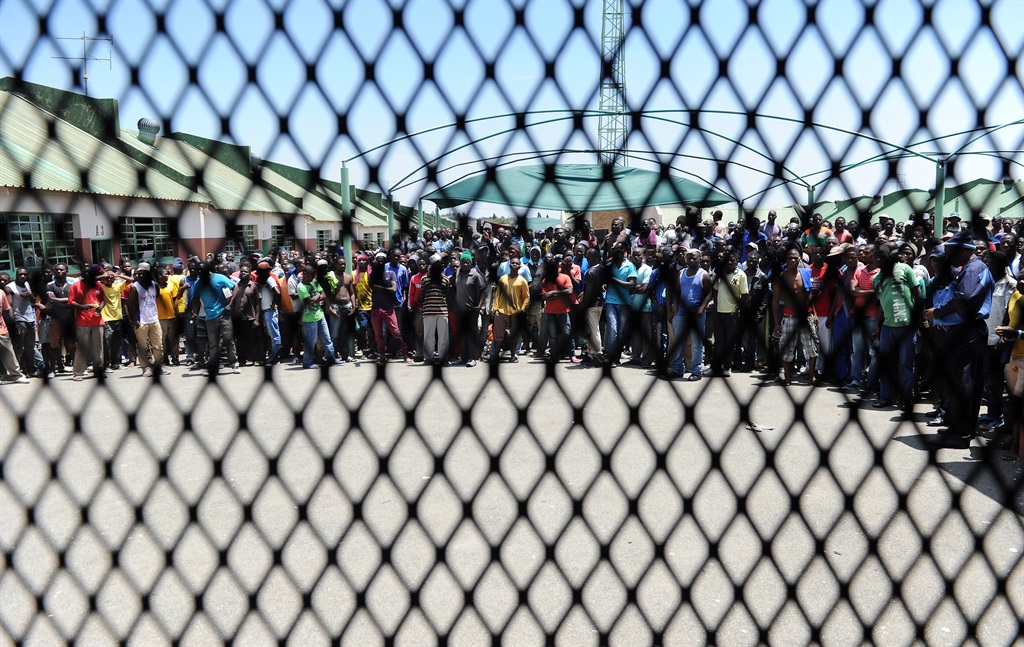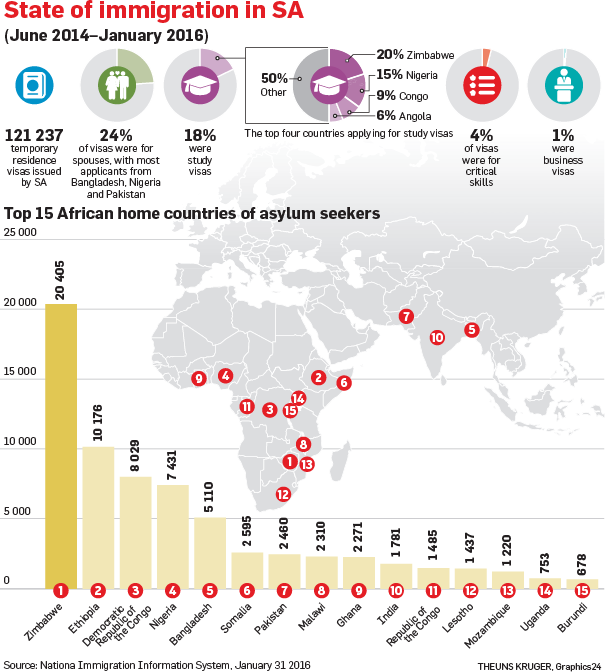
Uncertainty and fear have gripped asylum seekers in South Africa after unannounced changes have led to those who try to renew their documents being arrested, threatened and sometimes deported on the spot.
The changes relate to a White Paper on international migration, which was approved by Cabinet in March. Although it has not officially been made public, it seems the new policy is being implemented unofficially.
Asylum seekers this week told City Press that they were living in fear after officials threatened to deport them on the spot when they went to the home affairs offices in Marabastad, Pretoria, last month to renew their papers.
When Mary, a Zimbabwean domestic worker in her early 40s, went to renew her asylum application in Pretoria, she was detained for the day in a large hall with a number of other asylum seekers from southern African countries. Around the hall were smaller cells for detention, where others with questionable applications were locked up before being taken to the Lindela Repatriation Centre.
“I asked what is going on, and they said you have to go home [to Zimbabwe] ... you can’t be refugees forever, even South Africans came back [after being exiled during apartheid], so you must go back.”
Mary has been in South Africa since 2005, when hyperinflation sent the Zimbabwean economy into a tailspin. She said the economy had still not recovered enough for her to return to care of her children and ageing father, who depend on her.
The White Paper claims the current system is over-burdened: “The asylum seeker regime is being abused by economic migrants, resulting in over 90% of the claims for asylum being rejected.”
It is also mindful of xenophobic attacks in recent years by mobs that claim foreigners are taking their jobs and driving crime. In particular, it singles out Zimbabwe as a country many economic migrants leave to seek asylum in South Africa. As a result, genuine migrants in need of immediate protection are not getting the services they need, the document states.
It also says there is a perception that refugee status is a way to get permanent residence status and eventually become a citizen.
Mary told officials she would need to fetch her belongings and children before being deported, but officials told her: “You came to South Africa with nothing, you will leave with nothing.”
She was eventually released and told to buy a bus ticket and report for deportation in two weeks. She said she was too scared to go back to home affairs.
“I will just have to live illegally now,” she said.
Zimbabwean economic migrants on special dispensation permits face an uncertain future as their permits expire in December.
Acting home affairs spokesperson David Hlabane said: “There is no other arrangement at the moment until the new policy comes into effect regarding low-skilled migrants from [the Southern African Development Community].
“What will happen to Zimbabweans [and other regional immigrants] who have been in South Africa on asylum-seeker permits is a policy decision that South Africans will have to make when that time comes. It would be difficult to pre-empt what the decision will be.”
The clampdown seems to be in line with the new policy direction, which sees the immigration system moving from one that takes human rights into account to one that is based on security.
The White Paper argues that the largest influx of asylum seekers arrived as a result of the economic collapse in Zimbabwe, but that there is a similar trend across the region. It adds that there are also “human smugglers and traffickers who bring in people under the guise of being asylum seekers from as far away as northeast Africa and Asia”.
Policy changes, to be legislated by next year, include:
. The establishment of asylum-seeker processing centres where “high-risk” asylum seekers will be detained while their applications are being processed. It is envisaged that this will take about eight weeks. Low-risk asylum seekers will be released into the care of family or organisations.
. The removal of the automatic right to work and study for asylum seekers, which has been a “pull factor” for immigrants. Only in “exceptional circumstances such as judicial review” would asylum seekers be allowed to work and study.
. Refugees will no longer be able to apply for permanent residence, although there could be exceptions for those who are highly skilled or those with the ability to invest.
. Refugee status could also be withdrawn on the grounds of serious criminal convictions. Those who return to their home countries could also have their refugee status revoked.
Experts in migration say South Africa’s immigration policy is mirroring the recent global trend of considering international migration as a threat to the economic and physical security of countries and their people.
Loren Landau from the Centre for Migration and Society at Wits University said: “I suspect there is an independent political logic there that is appealing, and it only helps to reinforce the sense that foreigners are the reason people don’t have schools, jobs, houses or medicine.”
He says government has also started to enforce the policy of rejecting asylum seekers who could have sought asylum elsewhere, for example Somalis who could have sought asylum in countries such as Kenya, Tanzania or Malawi. This has, however, no basis in law as yet.
“My guess is that it [the policy] will be about keeping foreigners generally out of the spaza marketplace and construction, agricultural and hospitality [industries],” he said.
Landau said there was no proof that this policy would benefit South Africans or help transformation in the country. Rather, it is “a political move to appease populist pressures”.
Jacob van Garderen from Lawyers for Human Rights said South Africa was “reneging on its protection obligations” by rejecting asylum seekers from places such as Burundi and Somalia, and only accepting 4% of applicants. The detention of asylum seekers at border centres and the “introduction of draconian measures removing work and study authorisation for asylum seekers” were other examples of this.




 Publications
Publications
 Partners
Partners









